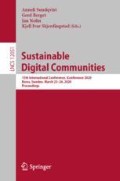Abstract
Everyday life often requires a great deal of work to manage the multiple domains that comprise it (e.g., paid work, family care, household maintenance, body and health management, leisure, education, social life, and community or religious involvement). This “boundary work” includes the ongoing categorization of life domains, the establishment and negotiation of boundary permeability, and the crossing of boundaries. The boundaries between the domains of everyday life are negotiated differently by different people and by the same person over time as life circumstances change. Information Science research tends to dichotomize “everyday life” and workplace information practices. Scholars seeking to understand the character of everyday life information practices must attend to the informational work required to (a) place, maintain, and challenge boundaries among life domains, and (b) orchestrate the bridging or crossing of those boundaries. This paper uses the example of keeping track of municipal waste collection to explore the informational work of managing, maintaining, and crossing boundaries in everyday life. Some participants recorded “garbage day” in centrally-located personal information management (PIM) tools shared with household members. By doing so, they integrated the task of waste disposal into an everyday life with other household members that included multiple domains, including paid work. Others’ approaches categorized waste collection as separate from the inside life of the household. The study provides evidence that participants engaged in boundary work within their non-work lives, beyond simply establishing boundaries between work and home.
Access this chapter
Tax calculation will be finalised at checkout
Purchases are for personal use only
Notes
- 1.
Elisabeth Davies, Nicole Dalmer, Cameron Hoffman-McGaw, Lucia Cedeira Serantes, Sherilyn Williams, Lola Wong.
References
Nippert-Eng, C.: Calendars and keys: the classification of ‘home’ and ‘work’. Sociol. Forum 11(3), 563–582 (1996)
Haider, J.: The environment on holidays or how a recycling bin informs us on the environment. J. Doc. 67(5), 823–839 (2011)
Beigi, M., Shirmohammadi, M., Otaye-Ebede, L.: Half a century of work-nonwork interface research: a review and taxonomy of terminologies. Appl. Psychol. 68(3), 449–478 (2019)
Kelliher, C., Richardson, J., Boiarintseva, G.: All of work? All of life? Reconceptualising work-life balance for the 21st century. Hum. Resour. Manag. J. 29(2), 97–112 (2019)
Savolainen, R.: Everyday Information Practices: A Social Phenomenological Perspective. Scarecrow Press, Lanham (2008)
Ocepek, M.G.: Bringing out the everyday in everyday information behavior. J. Doc. 74(2), 398–411 (2018)
McKenzie, P.J., Davies, E.: Genre systems and “keeping track” in everyday life. Arch. Sci. 12(4), 437–460 (2012)
Ashforth, B.E., Kreiner, G.E., Fugate, M.: All in a day’s work: boundaries and micro role transitions. Acad. Manag. Rev. 25(3), 472–491 (2000)
Star, S.L., Griesemer, J.R.: Institutional ecology, ‘translations’ and boundary objects: amateurs and professionals in Berkeley’s Museum of Vertebrate Zoology, 1907–39. Soc. Stud. Sci. 19(3), 387–420 (1989)
Kreiner, G.E., Hollensbe, E.C., Sheep, M.L.: Balancing borders and bridges: negotiating the work-home interface via boundary work tactics. Acad. Manag. J. 52(4), 704–730 (2009)
Savolainen, R.: Information behavior and information practice. Reviewing the “umbrella concepts” of information seeking studies. Libr. Q. 77(2), 109–132 (2007)
Campbell Clark, S.: Work/family border theory: a new theory of work/family balance. Hum. Relat. 53(6), 747–770 (2000)
Thomson, L.: When I’ve packed it in and they send me something: information boundaries in professional home offices. In: Proceedings of the ASIST Annual Meeting, vol. 50 (2013)
Palmer, C.L.: Information work at the boundaries of science: linking library services to research practice. Libr. Trends 45(2), 165–191 (1996)
Huvila, I., Anderson, T.D., Jansen, E.H., McKenzie, P.J., Worrall, A.: Boundary objects in information science. J. Assoc. Inf. Sci. Technol. 68(8), 1807–1822 (2017)
Braun, V., Clarke, V.: Using thematic analysis in psychology. Qual. Res. Psychol. 3(2), 77–101 (2006)
Corbin, J.M., Strauss, A.: Basics of Qualitative Research: Techniques and Procedures for Developing Grounded Theory. Sage, Thousand Oaks (2007)
Canadian Institutes of Health Research, Natural Sciences and Engineering Research Council of Canada, Social Sciences and Humanities Research Council of Canada: Tri-council Policy Statement: Ethical Conduct for Research Involving Humans - TCPS2. Public Works and Government Services Canada, Ottawa, Ontario (2018)
Jones, W.: Keeping Found Things Found: The Study and Practice of Personal Information Management. Morgan Kaufman Publishers, Burlington (2008)
Elliot, K., Neustaedter, C., Greenberg, S.: Time, ownership and awareness: the value of contextual locations in the home. In: Beigl, M., Intille, S., Rekimoto, J., Tokuda, H. (eds.) UbiComp 2005. LNCS, vol. 3660, pp. 251–268. Springer, Heidelberg (2005). https://doi.org/10.1007/11551201_15
Author information
Authors and Affiliations
Corresponding author
Editor information
Editors and Affiliations
Rights and permissions
Copyright information
© 2020 Springer Nature Switzerland AG
About this paper
Cite this paper
McKenzie, P.J. (2020). Informational Boundary Work in Everyday Life. In: Sundqvist, A., Berget, G., Nolin, J., Skjerdingstad, K. (eds) Sustainable Digital Communities. iConference 2020. Lecture Notes in Computer Science(), vol 12051. Springer, Cham. https://doi.org/10.1007/978-3-030-43687-2_8
Download citation
DOI: https://doi.org/10.1007/978-3-030-43687-2_8
Published:
Publisher Name: Springer, Cham
Print ISBN: 978-3-030-43686-5
Online ISBN: 978-3-030-43687-2
eBook Packages: Computer ScienceComputer Science (R0)

